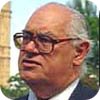|

|
Ivor Richard, Baron Richard
Ivor Seward Richard, Baron Richard, PC (born May 30, 1932), is a British politician and former member of the Commission of the European Communities.
Background
Richard is a native of Carmarthenshire in South West Wales, and went to school in Llanelli before attending the fee-paying Cheltenham College. He won the Wightwick Scholarship to Pembroke College, Oxford, where he studied Jurisprudence. He was called to the Bar in 1955 and practised as a Barrister in London.
Political career
He had been an active member of the Labour Party and the Fabian Society since University and stood for Parliament in South Kensington in the general election of 1959. This was one of the most prosperous constituencies in the whole of the country and he came third, but was intended as no more than an opportunity to try his campaigning skills. For the 1964 election, Richard was adopted as candidate for Baron's Court, a highly marginal constituency between Hammersmith and Fulham. Baron's Court had seen knife-edge contests before and the presence of the BBC television centre nearby ensured good media coverage.
Richard won the seat by just over 1,000 votes. In Parliament he served briefly as an assistant to Denis Healey as Secretary of State for Defence, and was appointed as Minister for the Army in 1969. He was lucky to keep his seat despite the swing to the Conservatives in the 1970 election, and became an opposition spokesman on telecommunications. He lost this job when he voted in favour of joining the European Communities (Common Market) in 1971, but was swiftly reappointed as a Foreign Affairs spokesman.
However, the Baron's Court seat was too small to survive the redistribution in 1969 and Richard found it difficult to find a new seat, as pro-Europeanism was not popular within the Labour Party. He was eventually chosen at the last minute to fight Blyth against the sitting Labour MP who had been deselected in a row over his allegations of the corruption of the local Labour Party. With no background in the area, and a popular opponent, Richard was defeated convincingly.
The incoming Labour government appointed him in June 1974 as the UK Permanent Representative to the United Nations, where he served for five years. Richard played a role in trying to bring together the sides in the Middle East conflict. He became a figure of controversy after the then US Ambassador, Daniel Patrick Moynihan, criticised the UN for passing a resolution stating that zionism was a form of racism, and Richard denounced him for behaving "like the Wyatt Earp of international politics"; shortly thereafter Moynihan was removed from office by Henry Kissinger.
The incoming Conservative government in 1979 replaced Richard within months. However, in 1980 he was chosen by the Labour Party to take one of the posts on the European Commission (replacing Roy Jenkins). It was known that he was the Labour Party's third choice for the position: former Treasury Minister Joel Barnett had rejected an invitation, and former Defence Secretary Fred Mulley had been vetoed by the Conservative government. Richard took responsibility for Employment, Social Policy, Education and Training.
Richard returned to Wales in 1985 and was appointed Chairman of World Trade Centre Wales Ltd., trying to persuade international business to invest in the country of his birth. In 1990, his name was included in a list of Labour Party 'Working Peers', he took the title Baron Richard, of Ammanford in the County of Dyfed and became an opposition spokesman in the House of Lords. His Barrister's style led to his appointment as Leader of the Labour Peers from 1992, which brought with it appointment to the Privy Council. Richard attempted to step up the Labour attack in the Lords and pioneered a Motion of No Confidence in the Government.
When Labour won the 1997 election, Richard became Lord Privy Seal and Leader of the House of Lords. With Labour policy favouring a reform of the House starting with removal of the Hereditary Peers, Richard began work on the new composition of the House, but was shocked when he was suddenly removed at the first reshuffle in July 1998 to be replaced by Baroness Jay of Paddington. His thoughts on the reform of the House were published in Unfinished Business in 1999 and Richard became a critical friend of the Government.
The Richard Commission
The Coalition Government in the National Assembly for Wales invited Richard to Chair a Commission on the future powers of the Assembly from 2002. The report was published on March 31, 2004 and recommended that the Assembly have full primary legislative powers in devolved areas from 2011, a recommendation that was controversial with Wales' Labour MPs.
|

